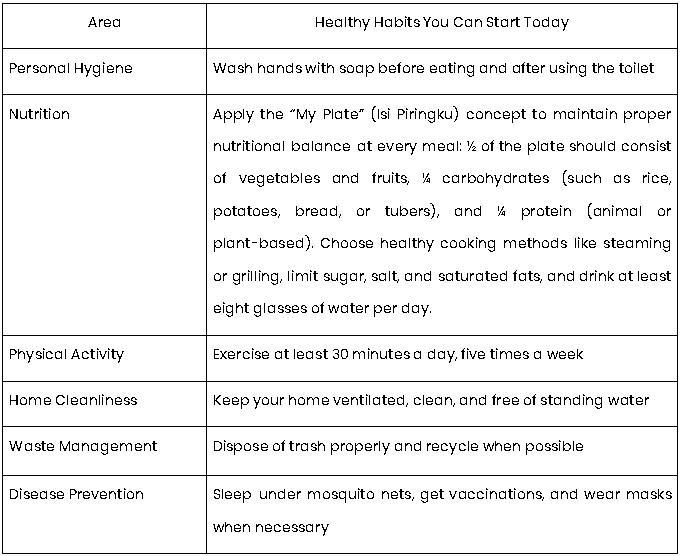By: Geraldus Sigap

What is Clean and Healthy Living Behavior (PHBS)?
Clean and Healthy Living Behavior (PHBS – Perilaku Hidup Bersih dan Sehat) is a set of daily habits and actions aimed at maintaining personal health, preventing disease, and promoting a healthier environment. The concept, widely promoted by public health programs in Indonesia, emphasizes the importance of awareness and discipline in maintaining hygiene, not only for ourselves but also for our families and communities. In simple terms, PHBS means making clean and healthy choices every day from how we eat and drink, to how we maintain our home, manage waste, and prevent disease transmission.
Why PHBS is So Important
The main goal of PHBS is disease prevention.
By maintaining cleanliness and adopting healthy habits, we can drastically reduce the risk of infectious diseases such as diarrhea, dengue fever, respiratory infections, and even lifestyle-related conditions like hypertension and diabetes. Practicing PHBS also brings broader benefits:
-
- Improves overall body fitness and immunity
- Supports mental well-being and productivity
- Creates a healthier home and community environment
- Reduces healthcare costs for individuals and families
In essence, clean and healthy living is the first line of defense against illness, and it starts with small daily actions.
Examples of Clean and Healthy Living Behaviors at Home

PHBS at School and the Workplace
PHBS doesn’t stop at home. Implementing clean and healthy living behavior in schools helps students stay focused, avoid illness, and create a positive learning environment. Meanwhile, at workplaces, PHBS practices, such as maintaining cleanliness, washing hands, ensuring good ventilation, and managing stress, contribute to higher productivity and fewer sick days.
Encouraging PHBS in shared spaces builds a collective culture of health, where everyone feels responsible for their well-being and that of others.
How to Build Consistent PHBS Habits
- Start with awareness: understand the importance of cleanliness and hygiene for long-term health.
- Lead by example: parents, teachers, and community leaders play a crucial role in shaping healthy habits.
- Make it routine: schedule regular cleaning, healthy meals, and exercise times.
- Use reminders: posters, digital apps, or community boards to reinforce key messages.
- Involve everyone: from family members to colleagues and neighbors, so the behavior becomes part of the community’s identity.
The Role of Health Facilities in Supporting PHBS
Hospitals and clinics also play a vital role in promoting PHBS through health education, early screening, and preventive check-ups. By identifying potential health issues early, individuals can receive timely interventions and avoid complications. By applying PHBS consistently, you’re not only protecting yourself from illness but also contributing to a healthier community. For regular health check-ups, nutrition advice, or preventive care, consult the Internal Medicine and General Health Team at RS Abdi Waluyo. Call 021-3144989 or make an appointment online at https://abdiwaluyo.com/ Today.
FAQ
1. What does PHBS stand for?
PHBS stands for Perilaku Hidup Bersih dan Sehat, which translates to Clean and Healthy Living Behavior, a lifestyle approach focused on hygiene, nutrition, and disease prevention.
2. Why is PHBS important for families?
Because families are the smallest unit of society. Practicing PHBS at home helps build healthier generations and prevents diseases from spreading.
3. How can I start living a cleaner and healthier life?
Begin with simple actions like washing your hands regularly, eating balanced meals, staying active, and keeping your home clean and well-ventilated.
4. Is PHBS only for individuals?
No, PHBS is a shared responsibility across households, schools, workplaces, and communities. Everyone plays a part in maintaining public health.
References:
- Nurhanifah, D. ., Ihsan Kamaruddin, M. ., & Andani, N. . (2024). Clean and Healthy Living Behavior Education to improve the knowledge of Elementary School Students. Jurnal Pengabdian Masyarakat Edukasi Indonesia, 1(1), 29–35.
- Nst, I. A., Ashar, Y. K., & Siregar, P. A. (2024). Factors Related to Clean and Healthy Living Behavior (PHBS) in Students. Indonesian Journal of Global Health Research, 6(3), 1783-1792.
